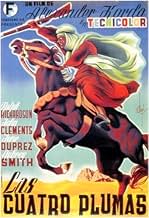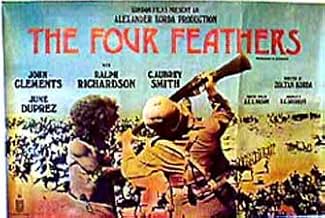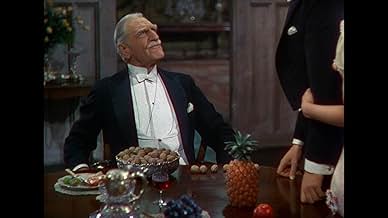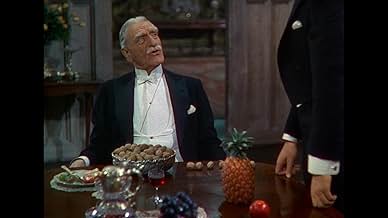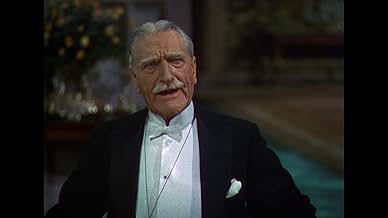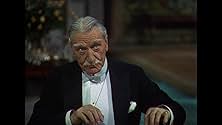Ajouter une intrigue dans votre langueA British Army officer resigns, burning his last-day summons to war in the Sudan. Accusing him of cowardice, his girlfriend and three friends give him white feathers. To gain redemption, he ... Tout lireA British Army officer resigns, burning his last-day summons to war in the Sudan. Accusing him of cowardice, his girlfriend and three friends give him white feathers. To gain redemption, he shadows his friends to save their lives.A British Army officer resigns, burning his last-day summons to war in the Sudan. Accusing him of cowardice, his girlfriend and three friends give him white feathers. To gain redemption, he shadows his friends to save their lives.
- Réalisation
- Scénario
- Casting principal
- Récompenses
- 1 victoire et 2 nominations au total
- Man
- (non crédité)
Avis à la une
I believe that the main reason this film is not given more credit is that it happened to be made in the watershed year of 1939, a year of legendary films, filmmakers, and stars. (Think "Gone with the Wind" and "The Wizard of Oz", among others.) The action scenes are as good as you can get. The technical direction is well done and the cinematography excellent. While the camaraderie is, at times, a little forced, it is probably fairly accurate.
The travails of the protagonist are straightforward and unimpeded by the burdens of political overtones or ethereal punishments for current retrospections on political transgressions and apologetic political correctness. I'll forego the 5.1 surround sound for the far better entertainment factor of the real "Four Featers" made in 1939
The film celebrates friendship and mutual obligation. It celebrates courage and determination. It celebrates a beautiful young couple and the love that conquers all, and celebrates the fact that the movies never let the funny-looking guy get the girl. It celebrates C. Aubrey Smith's eyebrows, and that's reason enough to watch any film.
The real heroes are Ralph Richardson, for acting at least 100% in every scene, never coasting or losing concentration for a minute, and the euphoniously named Osmond Borrodaile, whose second unit cinematography in faraway locations with monstrous cameras under difficult conditions enlivened many a movie.
But I'm not going to be internationalist about THE FOUR FEATHERS because this is a movie that makes you proud to be British , something that is sadly no longer allowed to happen these days . Perhaps the most stirring thing I can say about this movie is the way it wipes the floor with the contemporary competition that was coming out of Hollywood at the time . While the American studio were making similar monochrome movies with Errol Flynn and David Niven as the leads Ralph Richardson's performance alone is a reason to watch this movie and even if it wasn't there's still the story itself featuring themes like courage , honour , romance and redemption . You want battle scenes ? There's several in this movie as well choreographed as any thing seen in cinema at this time but perhaps the most what sets this British movie apart from other movies that were being produced across the pond is that it's a bit more gritty and sadistic than what Hollywood was producing . In one scene a British officer is flogged like a dog and he screams in pain as the camera pans on to the Mufti's face , a face lit up in sadistic glee , then the scene cross fades into a crowded dungeon where the prisoners are kept , a dark hell hole where the audience can actually taste the pain , fear and misery from the unfortunate prisoners . Even in those days Hollywood would pull their punches while a film like THE FOUR FEATHERSwould not
Sadly THE FOUR FEATHERS was released in 1939 which meant it qualified for the legendary Oscar ceremony the following year when GONE WITH THE WIND swept the board . A great pity because this very British movie deserved a hat full of awards . Sadly too Britain no longer has a film industry of its own and is reliant upon American finance , but perhaps the saddest thing is even if we did have a film industry no one in the business would want to film such an exciting historical epic in case they were labeled reactionary or racist
As in Stanley Baker's "ZULU" these giant black warriors are fearsomely portrayed with the scenes inside the primitive prison where the "dumb" spy Harry Faversham eventually finds himself are quite grim. And as another reviewer has commented, crusty Sir Aubrey as ever is the perfect & amusing retired tactician at the start & finish. A glare from under those bushy eyebrows was always enough! Great entertainment.
This is the best version of A.E.W Mason novel and contains a plethora of adventures , heroism, a love story and breathtaking battles. John Clemens as brave hero is memorable and Jane Duprez as gorgeous heroine is charming . Ralph Richardson as the blind comrade is awesome . Touch of humor is supplied by C. Aubrey Smith as the resourceful veteran military . Special mention to cinematography in a colorful and glimmer Technicolor at charge of George Perinal . Spectacular musical score by the classic musician Miklos Rozsa . The film has been magnificently realized by Korda brothers , Zoltan (direction) , production design (Vincent) and production (Alexander Korda). Other versions of Mason novel are ¨Storm over the sand¨ (1955) by Terence Young with Laurence Harvey, Anthony Steel and Mary Ure ; 1977 Television remake with Beau Bridges , Robert Powell and Jane Seymour and last adaptation (2000) by S. Kapoor with Heath Ledger , Wes Bentley and Kate Hudson . The motion picture will appeal to adventure genre fans and classic cinema enthusiasts .
Le saviez-vous
- AnecdotesDirector Zoltan Korda's own remake of this film, Les 4 plumes blanches (1955), re-used a lot of the battle sequences from this movie, which did not lend themselves very well to the cropping necessary to achieve the width of the CinemaScope ratio, nor did their comparative fuzziness blend well with the new footage.
- GaffesWhen General Burroughs is talking in the garden with Ethne, his swagger stick reverses ends.
- Citations
Harry Faversham: In England, the white feather is the mark of a coward.
Dr. Harraz: Ah, I see. Then why worry? Be a coward and be happy.
Harry Faversham: No, Doctor. I have been a coward, and I wasn't happy.
- Crédits fousOpening credits prologue: In 1885 the rebellious army of cruel dervishes enslaved and killed many thousands of defenceless natives in the Sudan, then laid siege to Khartoum. The scanty garrison's heroic commander, General Gordon appealed for help from England - but no help reached him.
- ConnexionsEdited into Les 4 plumes blanches (1955)
- Bandes originalesAuld Lang Syne
(1788) (uncredited)
Lyrics by Robert Burns, music traditional
Heard during the departure of the Regiment
Meilleurs choix
Détails
- Durée
- 2h 9min(129 min)
- Rapport de forme
- 1.37 : 1


